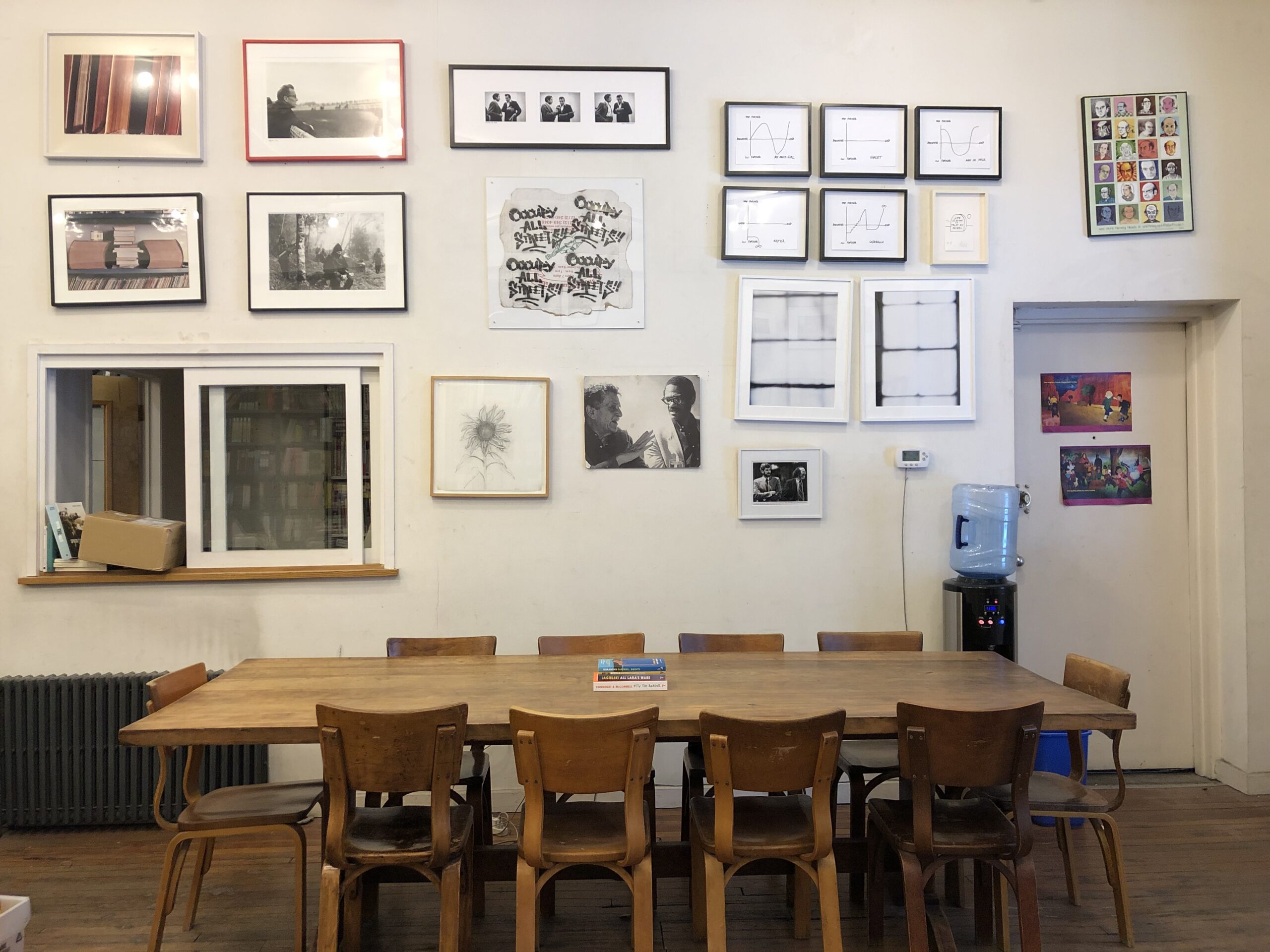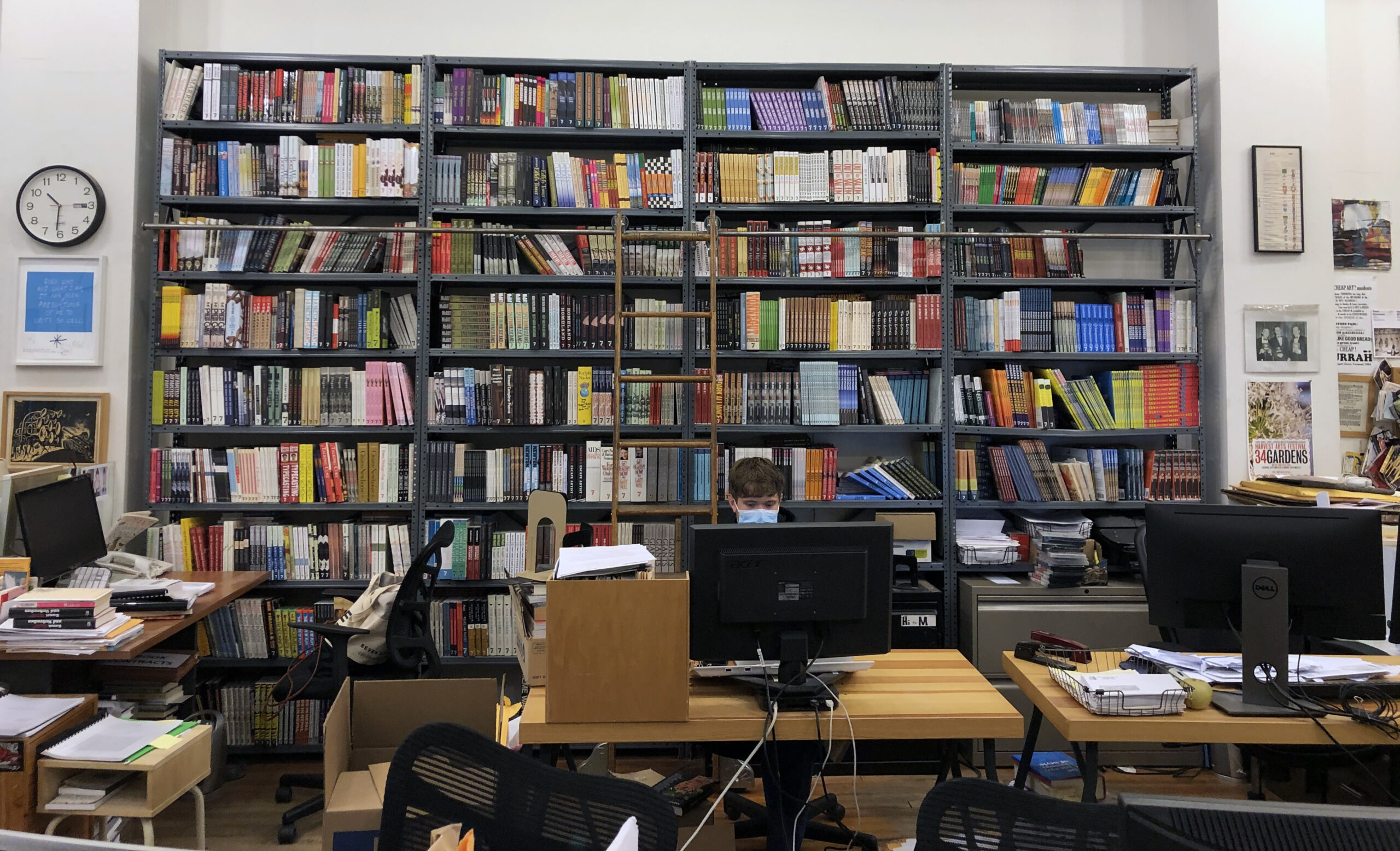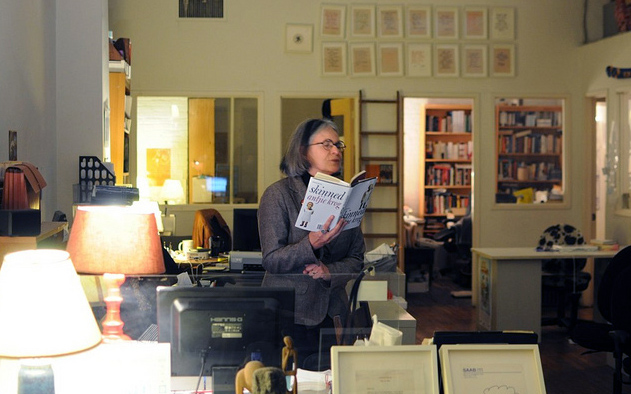
Interview with an Indie Press: Seven Stories Press
On Trusting Readers to Handle Complex Projects
At a time when “quarantine reading” essays are in abundance on the internet, and every last thing (both online and off) seems cast in the light of the coronavirus pandemic, several new books have landed that are genuinely, organically suited to this moment in time and its many challenges. The Lost Soul by Nobel Prize winner Olga Tokarczuk and illustrator Joanna Concejo, published by Seven Stories Press this year, was one of those rare books. Tokarczuk’s words and Concejo’s illustrations portray a man who has lost touch with life’s vitality and longs to regain it; described by the publisher as “a deeply moving reflection on our capacity to live in peace with ourselves,” what the book really offers is the chance to slow our attention for a few moments—a rare privilege these days.
It’s the kind of project that Seven Stories Press has pursued since its creation in 1995, when it began building a list of “works of the human imagination,” from fiction to nonfiction and inventive hybrid projects. Members of the Seven Stories Press staff answered questions about staying connected to readers, how some publishers underestimate the public, and which new books are filling up their shelves.
*
What are some of the biggest risks you’ve taken as a business? How did you navigate them?
You have to love taking risks to be a publisher. You’re making bets all the time. But you’re asking as a business. Well, I would have to say that as a business the time of greatest risk—and very possibly also of greatest reward—is right now, this year, next year. We’re on a growth curve, which has not always been the case. The marketplace for books actually grew in America last year, but at the same time it is much harder today for independent publishers to break out a book than it was even as recently as a decade ago. We just have no idea what things are going to be like really post-COVID. And even though we are fortunate to have a fantastic backlist, you cannot thrive on a backlist alone. So the great gamble today and tomorrow is about finding the new ways that you can break out new voices, new titles, as an independent press. We’re very hard at work on that! –Dan Simon, publisher and editor-in-chief
 Seven Stories Press’ office in New York City.
Seven Stories Press’ office in New York City.
What are some of the benefits to working at an independent press?
Working at an independent press is the best job you can have in book publishing by far. At a time when conglomerates are taking over our industry, I find there’s a spirit of genuine joy, collaboration, experimentation, and mentorship at indie presses, and I’m so happy to be a part of it at Seven Stories. I love how there’s space to operate outside my specific role, and it’s so fun to be involved in projects like acquiring books, strategizing about bookclubs, or designing advertisements. –Claire Kelley, Director of Library & Academic Marketing
“By and large, the publishing industry underestimates the complexity of the reading public.”
How has the coronavirus crisis changed your work?
For a business whose end-product is a thing, a book, we adapted pretty quickly to an entirely remote and virtual day-to-day. We have a small staff that has been working over the past year from Oakland, Los Angeles, Buenos Aires, Puerto Rico, Boulder CO, Rome Italy, Philadelphia, upstate New York, Brooklyn, and just one of us from our Tribeca office, and Zoom meetings aside, it’s been pretty productive for all. We significantly reduced our printing and distribution of advance galleys since reading digitally became a necessity for booksellers, librarians and reviewers. And we pivoted to virtual author events including a series of graduation parties last spring (and again this spring) in partnership with the Kurt Vonnegut Memorial Library featuring Paul Auster, Jackie Woodson, Lewis Black, and others—check out our Events page to see what’s to come.
At the beginning of the pandemic, we also produced a slew of virtual children’s book author live readings for newly stuck-at-home kids, and we offered free e-books to some students who were suddenly without their printed, classroom copies of Howard Zinn’s A Young People’s History of the United States or Ron Takaki’s A Different Mirror for Young People. It’s been a steep learning curve for us all, but it’s been really gratifying to find new ways to stay in touch with our readers and book-world partners. –Ruth Weiner, Publicity Director, Seven Stories Press, and Associate Publisher, Triangle Square Books for Young Readers

Were there any titles in particular that were game-changers for your business?
Everything is very personal at SSP, so many many of the books we published have been game-changers because we’re just very relationship-based. I could talk about Octavia Butler’s Parable novels, or Kurt Vonnegut’s A Man without a Country, or Noam Chomsky’s 9-11. Barry Gifford. Annie Ernaux. Innosanto Nagara. We tend to have very long relationships with our authors, and when you look at our catalogue online, you see that it’s not uncommon to see ten books by an author, and very rare to see only one. Publishers talk about discovering authors, but in our case so many of our authors more or less discovered us, and changed us in the process.
A couple of very recent cases. Alex DiFrancesco’s Transmutation, a short story collection coming in July that depicts transgender realities in a range of styles and tonalities. That book has been a teacher here because the author is embarked on exactly the kind of truth-telling project that we exist for, and at times I will confess they have had to remind me of that and I’ve thanked them because the marketplace in the US can be so crushing but the marketplace is only the tool we use to get good books into readers’ hands, it’s not the be all and end all.
Also, Nina Burleigh’s Virus, coming in mid-May. We kept this book under wraps for the three months it took Nina to write it, from December 2020 through February 2021. She was sending me chapters at the rate of one a week for much of that time, and the whole experience was bracing because she didn’t hold back. She put the totality of what the pandemic year really was, the horror and the very specific causes. It’s actually overwhelming and Nina has really done that aided not so much by ideology as just by her inner toughness which I came to respect just so much. So I guess those are two recent examples of what it means to be a relationship-based publisher as we are. –Dan Simon, publisher and editor-in-chief
What are some projects you’re particularly excited about at the moment?
My favorite recent Seven Stories book was written as if for our current crisis moment and everyone should have the pleasure of reading it. Nobel Prize winner Olga Tokarczuk’s picture book The Lost Soul tells the story of a man who has rushed through life such that he’s lost his soul. He has to stop and wait for it to catch up to him. The illustrations by Joanna Concejo are dreamy and quietly meditative, and reading the book is like a balm, both a reminder and an excuse to slow down. If you haven’t read Spencer Reece’s gorgeous memoir of repressed sexuality, drinking, and, most of all, the gift of poetry, The Secret Gospel of Mark, you should get yourself a copy now.
And there are a few stunners on our Fall list: Kia Corthron’s second novel Moon and the Mars, narrated by a young girl who is half Black, half Irish, immerses the reader in pre-industrial New York’s Five Points neighborhood (now the City Hall/Chinatown area) and the turbulent events leading up to the Civil War; Kim Thuy’s Em is a short, intense narrative of displacement and yearning for a group of Vietnamese refugees whose lives interweave throughout the book—it sent me searching out her first book Ru, which I also highly recommend; and, lastly Innosanto Nagara (A is for Activist) and Mona Damluji’s new board book, Together, shows the youngest readers the power of people acting together. I just wish my kids were still young enough that I could read it to them. –Ruth Weiner, Publicity Director, Seven Stories Press, and Associate Publisher, Triangle Square Books for Young Readers
 Antjie Krog reads at the Seven Stories Press office.
Antjie Krog reads at the Seven Stories Press office.
How do you get feedback from your readers?
One thing I’ve enjoyed so much since transitioning from publicity to leading our web team full time is engaging directly with readers on social media, through our newsletter, and even on the phone (!). Talking to the media is great, obviously, but talking directly with our readers has given me much deeper insight into the successes, and the shortcomings, of our approach to publishing literature. We can talk all we want internally about what people like to read, and what kinds of books people gravitate towards as a whole, but all of that pales in comparison to what we can learn from speaking with our readers directly, and seeing what specific books people are drawn to on our website, in bookstores, and in libraries. By and large, the publishing industry underestimates the complexity of the reading public, and tends to put their weight behind books based on what executives believe might appeal to an imaginary audience (looking at you, Big 5). At Seven Stories, we tend to publish books not so much because we hope they will sell, but because we hope they will be read. And we can’t do that without directly engaging with readers. –Allison Paller, Web Manager
“At Seven Stories, we tend to publish books not so much because we hope they will sell, but because we hope they will be read.”
What’s another indie press you love/would recommend?
We like to collaborate with other radical indie publishers and friends of Seven Stories like Verso, Haymarket, New Press, Beacon Press, and New Press—we’ve done bookseller and librarian preview events together. I’m from Ohio and have followed the success of family-owned independent publisher Two Dollar Radio, and I can’t wait to go have some vegan food in their bookstore café when I’m back in Columbus next. I’ve also been impressed with Black-owned and run Daydreamer Press, founded by Carlotta Penn, who gave a TED Talk on the importance of Black voices in children’s books and self-representation in book publishing.” –Claire Kelley, Director of Library & Academic Marketing
There are so many! Not exactly an indie, and I’m sure my friends and colleagues are so tired of me talking about this, but University of Nebraska Press’ Bison Books imprint has one of the most impressive literary translation backlists I’ve ever seen. They keep having these amazing sales and I, being a total sucker, keep filling my tiny apartment with their slim, beautiful books. Similarly, I’m consistently blown away by the offerings of Open Letter, Semiotext(e), Two Lines Press, Transit, Dorothy, Coffee House, Deep Vellum, Verso (especially their fiction imprint—read Terminal Boredom by Izumi Suzuki (tr. Polly Barton)!), and, obviously, New Directions. I’m also really looking forward to watching A Public Space grow their publishing project over the coming years. Small publishers are doing super exciting work right now, and I feel so lucky to experience this boom firsthand. –Allison Paller, Web Manager
How do debut authors reach/pitch you?
Officially, we no longer accept unsolicited manuscripts. We reluctantly made that change during COVID, because it simply became impossible to keep up with submissions when the staff was entirely remote and we were unable to bring on new interns as we normally would. We are catching up slowly on the backlog of submissions. Something really special usually has a way of finding its way to us whether agented or recommended by our authors or friends of the house. Again, we have beautiful relationships with certain agents, certain foreign publishers, and there are other agencies and foreign publishers we admire where we’re looking for projects to do together, and it continues to be true that a substantial portion of our authors are unagented. –Dan Simon, publisher and editor-in-chief












